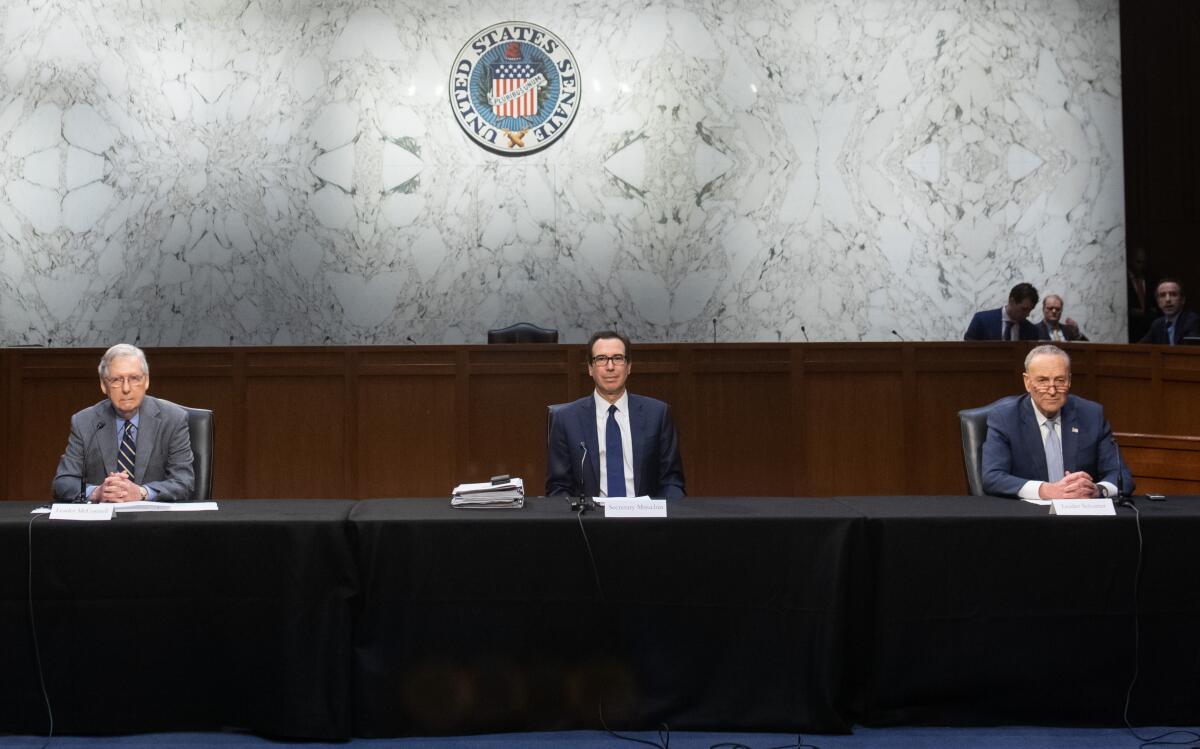Column: Congress’ solutions to the coronavirus crisis are stuck in the past

The social and political response to major catastrophes often proceeds in stages. Stage 1 is denial. Thankfully, this stage is largely over for the coronavirus crisis. Not counting a few poltroons and conspiracy theorists, nobody is saying it’s all hype or no big deal.
Now we’re transitioning, in fits and starts, from Stage 2 to Stage 3.
Politicians and policymakers are taking the threat seriously, but lacking contingency plans and the mental bandwidth to deal with all of the challenges that are arising, they’ve been falling back on what they already believe to be true. Stage 2 is the “COVID-19 confirms my priors” period.
For many Democrats, the roaring economy of eight weeks ago was the perfect time to push for canceling student debt, establishing a $15-per-hour minimum wage, creating “Medicare for all,” etc. A runaway pandemic and the start of a massive shutdown of the economy only made it more obvious that all these “priors” were absolutely fundamental and necessary.
For many Republicans, the roaring economy was the perfect time to push for tax cuts, strict immigration restrictions, including a border wall, a new cold war orientation toward China and to declare war on the media for being mean to the president. And lo and behold, as the coronavirus crisis shaped up, they too believe their earlier ideas were all the more justified.
Just because these policies are priors, it doesn’t mean they are necessarily ill-suited to the moment. For instance, canceling some student debt makes sense now more than before, and a major rethinking of our economic entanglement with China seems acutely overdue. But this has more to do with serendipity than critical thinking.
Sometimes, we get stuck in Stage 2. Shortly after 9/11, Sen. Charles E. Schumer bowed to Democratic form when he wrote an op-ed for the Washington Post arguing that “the era of a shrinking Federal government is over.” (He called, familiarly, for a “‘new’ New Deal.”) President George W. Bush, who ran for president arguing for a “humble” foreign policy, reverted to the conservative foreign policy establishment’s preference for regime change and nation-building, at least in part because it was the only fleshed-out program available. Both priors prevailed, not to our particular benefit.
This is not to say that both sides don’t try their best to deal with emergencies. But just as the stockpile of masks and ventilators is not adequate to the sudden demand, the same holds for the storehouse of policies we could put into effect right now. Or to be more fair to the wonks who warned about some of these problems, there’s a lag time in getting new and better policies into production.
What Stage 3 of the coronavirus crisis will look like remains murky. Andrew Yang’s quest to make universal cash payments to Americans seemed quixotic just weeks ago. Now it looks like the bedrock of a new policy agenda. The historic Republican resistance to direct interference in corporate decision-making is being worn away by the hour, and once swept aside it seems unlikely to return in nearly as robust form. A new consensus may be quickly forming that the government should have a much bigger say in how supply chains are structured, regardless of the corporate bottom line. It’s almost certain that the U.S. pharmaceutical industry’s dependence on China’s stranglehold of basic medicinal ingredients will not survive this pandemic.
Other specific responses are still in the early stages, and big questions will need to be addressed, from how exactly we should deploy the Defense Production Act to how to reconcile our federalist structure to public health crises.
Perhaps oddly, I find myself wondering — and worrying — a lot about Stage 4. How will things look when this is all over? What will be the new normal? Will the handshake ever return? What emergency measures now will be our everyday reality years from now?
Tax withholding was invented to collect revenue during World War II. The imperial presidency, with its vast retinue of executive branch officials answerable directly to the presidency, was created to give Franklin Roosevelt more power to fight the Great Depression.
This pandemic will no doubt have a similarly long tail. The foundation of the property laws of Anglosphere nations was created as a response to the crisis of the Plague (historian Norman Cantor writes, “A barrister of 1350 deep frozen and thawed out today would need only a six-month refresher course at a first-rate American law school to practice property or real estate law.”).
One of my priors is the idea that our political parties are long overdue for a major transformation. The coalitions that constitute them are unstable and combustible. The ideas that once bound them together are frayed. This crisis is sure to put even more strain on these already feeble institutions, as politicians are dragged out of their comfort zones. It’s too soon to tell if this assessment will be confirmed, but I’d take bets that when this is all over, political scientists, like so many others, will be writing about B.C. and A.C. — before coronavirus, and after.
More to Read
A cure for the common opinion
Get thought-provoking perspectives with our weekly newsletter.
You may occasionally receive promotional content from the Los Angeles Times.










